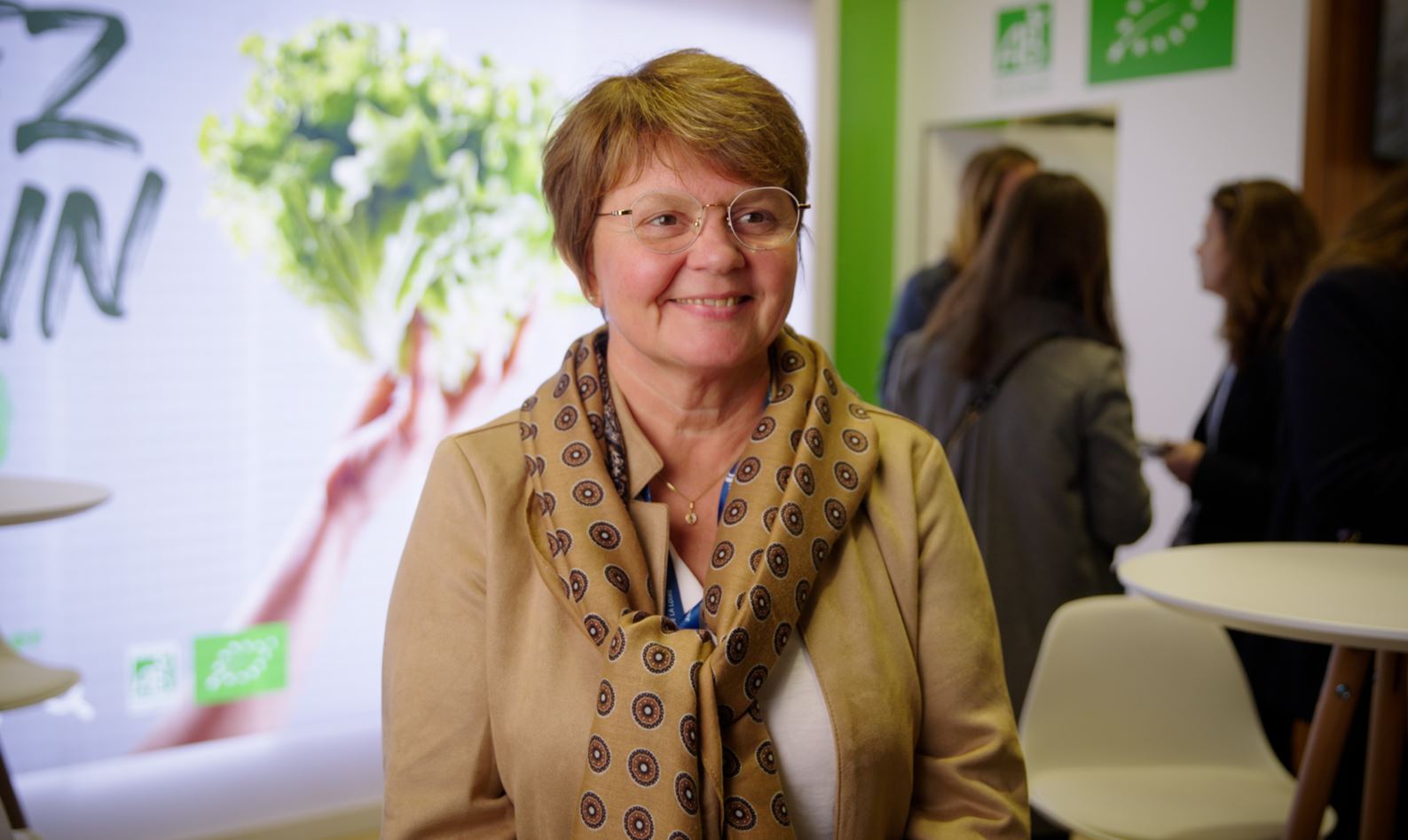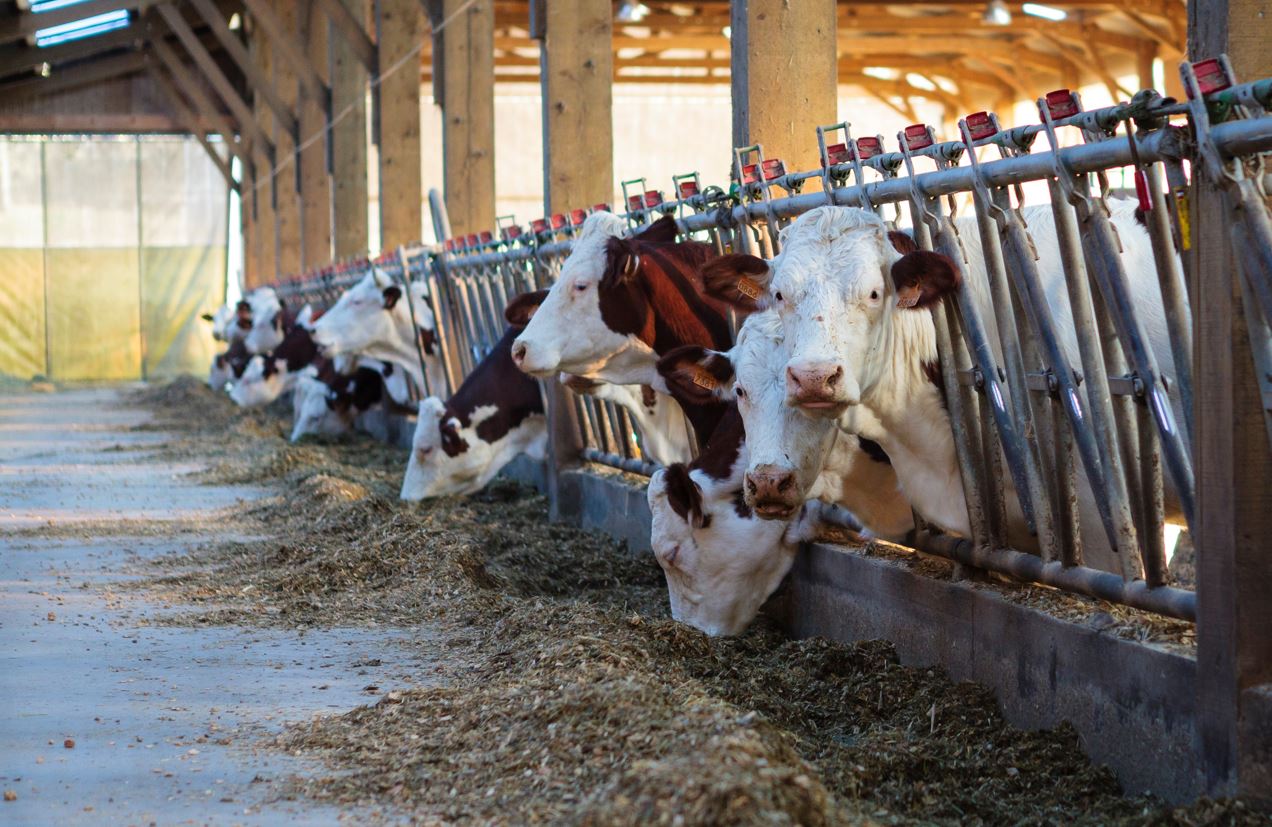
How local and regional authorities are encouraging the use of organic dairy products in catering services
Following ten years of soaring growth and a significant rise in both production and consumption, over the last two years, organic dairy products have seen unprecedented decline in the domestic market. Raising awareness is an essential step to reduce the supply-demand imbalance threatening the organic dairy sector, particularly among the food services sector, which represents a crucial area of growth for the organic market. Patricia Maussion is a dairy farmer working organically in Maine-et-Loire and a regional councillor for the Pays de la Loire agricultural commission, where she is notably responsible for organic agriculture. She takes us through some of the initiatives implemented by local and regional authorities to support the roll-out of organic dairy products in canteens.Organic dairy consumption in decline
Regulated at European level since 1991, organic agriculture describes production and processing practices that exclude the use of manufactured chemicals and keeps inputs to a minimum. Managing a herd of dairy cattle organically most commonly involves pasture-grazing, and a diet composed of only organic, GMO-free feed. The entire herd receives particular care and attention, with preventative medicine and natural therapies generally favoured over antibiotics.
Faced with growing demand and an ambitious roadmap to develop organic dairy farming, many farmers have made the transition to organic agriculture over the last decade. Organic dairy production in France has grown rapidly, with the nation becoming Europe’s leading producer. Nevertheless, this thriving market has lost its shine over the last two years given the fall in consumption, which is all the more worrying against a landscape of inflation and soaring food and energy prices. For Patricia Maussion, “Organic agriculture suffers from a lack of general awareness. In these complicated economic conditions, raising awareness of the qualities and advantages of organic produce among distributors and consumers is more important than ever.”
Faced with growing demand and an ambitious roadmap to develop organic dairy farming, many farmers have made the transition to organic agriculture over the last decade. Organic dairy production in France has grown rapidly, with the nation becoming Europe’s leading producer. Nevertheless, this thriving market has lost its shine over the last two years given the fall in consumption, which is all the more worrying against a landscape of inflation and soaring food and energy prices. For Patricia Maussion, “Organic agriculture suffers from a lack of general awareness. In these complicated economic conditions, raising awareness of the qualities and advantages of organic produce among distributors and consumers is more important than ever.”
Catering services, a driver of growth for the organic sector
With more than 80,000 canteens and some 13 million people fed daily, collective catering, particularly in schools, is a major area of growth for organic agri-foods in France. The segment has in fact grown significantly in canteens following the French EGalim Law, which was passed further to the National Food Conference and focuses on “balanced trade relationships in the agricultural and food sector, and healthy, sustainable food, accessible to all”. The law also states that organically farmed produce should account for 20% of food purchases in collective catering by 1st January 2022.
Given that organics account today for only 8% of purchases within the sector, of which dairy is the leader, there is a long way still to go to reach this target. Faced with the risk of seeing some organic food suppliers move away from the collective catering sector, Patricia Maussion sends out a stark warning: “Food must not become the adjustment variable. There are many potential solutions to ensure organic products remain on consumer plates. To achieve this, local and regional authorities have an essential role to play in supporting collective catering services; at regional level for example, we have actioned a number of measures in secondary schools.”
Given that organics account today for only 8% of purchases within the sector, of which dairy is the leader, there is a long way still to go to reach this target. Faced with the risk of seeing some organic food suppliers move away from the collective catering sector, Patricia Maussion sends out a stark warning: “Food must not become the adjustment variable. There are many potential solutions to ensure organic products remain on consumer plates. To achieve this, local and regional authorities have an essential role to play in supporting collective catering services; at regional level for example, we have actioned a number of measures in secondary schools.”
Organics in canteens – measures implemented by local and regional authorities
Communes, departments and regions play an essential role in developing organics within collective catering services. Take for example, the objective set by the Pays de la Loire region, where food supplied to school canteens must be 100% made in France, of which 50% sourced from the region, and 20% with ‘quality’ and/or organic labels.
It is therefore essential that efforts continue to raise awareness among collective catering outfits of the challenges surrounding organic foods, and to support staff as they adapt their practices, in terms of the products they offer, but also food and energy waste. Some initiatives can even engender cost savings, meaning catering staff have bigger budgets to buy better products.
“Incorporating organic foods into menus does not have to mean radical change; instead, it could imply re-organising kitchens and working methods, using different equipment, and also briefing canteen chefs and managers accordingly,” explains Patricia Maussion. Financial support at a regional level is available to any establishments wishing to replace their equipment. “Introducing a self-serve salad or dessert counter often frees up time for meal preparation – since with organics, nothing is bought pre-prepared – everything has to be made from scratch. With regards to dairy, we have also seen producers supply yoghurt in 5kg containers rather than individual pots. It’s a solution that reduces wastes and keeps costs to a minimum.”
Visits to organic farms and food companies are also organised for stakeholders within the collective catering sector. “Meeting farmers, being able to engage in conversation and see how they work, gives a real insight to better understand the reality and the advantages of this sector,” underscores the regional. Councillor.
Finally, local authorities may introduce technological solutions to ease the burden of administration and logistics and facilitate the sourcing of organic produce. Approcol is a typical illustration: a website set up by the Hauts-de-France Chamber of Agriculture, it serves as a platform connecting canteens with producers, agri-food companies and local wholesalers to to enable them to easily find and order organic products in their region. The Easilys software is another example, now available in every secondary school in the Pays de la Loire region, for more effective cost management and procurement planning.
It is therefore essential that efforts continue to raise awareness among collective catering outfits of the challenges surrounding organic foods, and to support staff as they adapt their practices, in terms of the products they offer, but also food and energy waste. Some initiatives can even engender cost savings, meaning catering staff have bigger budgets to buy better products.
“Incorporating organic foods into menus does not have to mean radical change; instead, it could imply re-organising kitchens and working methods, using different equipment, and also briefing canteen chefs and managers accordingly,” explains Patricia Maussion. Financial support at a regional level is available to any establishments wishing to replace their equipment. “Introducing a self-serve salad or dessert counter often frees up time for meal preparation – since with organics, nothing is bought pre-prepared – everything has to be made from scratch. With regards to dairy, we have also seen producers supply yoghurt in 5kg containers rather than individual pots. It’s a solution that reduces wastes and keeps costs to a minimum.”
Visits to organic farms and food companies are also organised for stakeholders within the collective catering sector. “Meeting farmers, being able to engage in conversation and see how they work, gives a real insight to better understand the reality and the advantages of this sector,” underscores the regional. Councillor.
Finally, local authorities may introduce technological solutions to ease the burden of administration and logistics and facilitate the sourcing of organic produce. Approcol is a typical illustration: a website set up by the Hauts-de-France Chamber of Agriculture, it serves as a platform connecting canteens with producers, agri-food companies and local wholesalers to to enable them to easily find and order organic products in their region. The Easilys software is another example, now available in every secondary school in the Pays de la Loire region, for more effective cost management and procurement planning.
The dairy sector highly mobilised
The Cniel is also committed to promoting organic dairy products alongside regional authorities, which is precisely the objective of the “Prenez en main la bio” campaign ( “Take charge of organic” in English), co-funded by the EU and orchestrated in partnership with Interfel, the French interprofessional body for fresh fruit and vegetables. The communications campaign is supported by a dedicated website, in addition to various promotional tools, communications materials and forums set up to raise awareness among stakeholders of the features and values of organic farming and to support the development and supply of organic in collective catering.
Essential to environmental transformation and food sovereignty in France, for organic agriculture to continue to develop, supply and demand must evolve together. Patricia Maussion underlines the point: “An additional challenge for the dairy sector is its attractiveness for the next generation. We need young producers to take up the mantel for organic dairy production to continue.” The important awareness-raising campaign targeting consumers and stakeholders within the catering sector must therefore continue, reinforced by communities and interprofessional bodies.
To address the slump in demand for organic dairy products and fresh fruit and vegetables, the Cniel and Interfel are committed, alongside regional authorities, to meeting the objectives set out by the EGalim Law. The EU promotional programme ‘Prenez en main la bio” (Take Charge of Organic) was also launched with the same aim, supported notably by a dedicated website, a range of communications tools, and a series of talking forums to support stakeholders.
Essential to environmental transformation and food sovereignty in France, for organic agriculture to continue to develop, supply and demand must evolve together. Patricia Maussion underlines the point: “An additional challenge for the dairy sector is its attractiveness for the next generation. We need young producers to take up the mantel for organic dairy production to continue.” The important awareness-raising campaign targeting consumers and stakeholders within the catering sector must therefore continue, reinforced by communities and interprofessional bodies.
To address the slump in demand for organic dairy products and fresh fruit and vegetables, the Cniel and Interfel are committed, alongside regional authorities, to meeting the objectives set out by the EGalim Law. The EU promotional programme ‘Prenez en main la bio” (Take Charge of Organic) was also launched with the same aim, supported notably by a dedicated website, a range of communications tools, and a series of talking forums to support stakeholders.
YouTube is disabled. Accept cookies to view the video.
Pour faire face au ralentissement de la demande en produits laitiers et fruits et légumes frais bio, le Cniel et Interfel s’engagent aux côtés des collectivités pour atteindre les objectifs de la loi Egalim. C’est dans ce but qu’a été lancé le programme européen « Prenez en main la bio », avec notamment un site dédié, différents outils d’information et temps d’échanges visant à accompagner les professionnels. Pour en savoir plus rendez-vous ici : https://www.prenezenmainlabio.eu/
undefined 02/08/2024
undefined 09/09/2024


